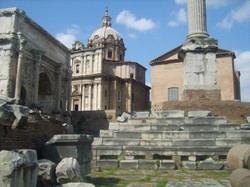"Laudato Si" is a mediaeval Italian phrase for praised be you. It is drawn from St Francis of Assisi's Canticle of the Sun, a hymn that praises God's presence in nature, and it is a favourite of Pope Francis, who took his papal name from the man who inspired him. Encyclicals generally have a Latin name, but the pope has diverted from custom and practice to emphasize ideas that are important to him. But the subtitle is "On Care for our Common Home." This itself is a slight deviation from those theologians and clerics who claim that heaven is our true home. For the pope our home is here, though he has said that he has not long ere he goes to the house of the Father. Well, we all move house sometimes, but for the moment for all of us home is here, and this means that we are bound to look after it and those with whom we share it.
The encyclical cites previous, of-neglected papal teachings. From Paul the Sixth's encyclical Pacem in Terris [Peace on Earth, 1971] he cites the teaching that the growth of humanity cannot be purely technological, but must go hand in hand with moral and spiritual progress, and notes that this has not happened. From John Paul the Second he draws upon a heightened awareness of the ecological threat to which Paul the Sixth alluded and re-states the principle that ecological well-being and the well being of humans go hand in hand and that we must therefore seek a genuinely human ecology in which humanity and nature are seen as a unity. From Benedict the Sixteenth, he draws upon the statement that social and economic structures must radically change to save the planet and those in it.
But other sources are significant. Following the citation of previous popes's social teaching, he makes extended reference to the Ecumenical Patriarch Bartholemew, head of the Orthodox church, whose teaching on ecological matters Francis cites with enthusiasm. Francis re-states Bartholemew's teaching that we all must be aware that we are guilty of environmental sins in small ways, by excess, by waste and by unsustainable lifestyles. This is the first time that a pope has ever cited a patriarch and is a sign of the growing friendship between Catholic and Orthodox churches that the popes have sought to develop. The encyclical also makes extended reference to Francis of Assisi, the saint whose love of nature was renowned, and he affirms Francis' belief that the earth is our sister. From Francis' disciple Bonaventure he takes the view that St Francis gained his deep love for nature from contemplation of the source of nature, God, and the pope implies that humans too must return to the source of all being to safeguard their common home.
Originality is more often in the combination than the elements themselves. This is not the first encyclical to be addressed to all humankind, that was from John the Twenty Third;and it was not the first encyclical to have a non-Latin title, that was Mitt Brendender Sorge, Pius the Eleventh's anti-Nazi letter in the 1930s. But it is original in its preference for simple language and for citing a source from non-Catholic churches. It is also the first papal encyclical on the environment.











 Darkness over the Earth the skies darkened when Jesus was crucified24 days ago
Darkness over the Earth the skies darkened when Jesus was crucified24 days ago
 TheThousand Year Gardenon 11/26/2025
TheThousand Year Gardenon 11/26/2025
 Women of the Gospelson 10/11/2025
Women of the Gospelson 10/11/2025
 Religious Gardenson 08/25/2025
Religious Gardenson 08/25/2025



Comments
Thank you for your comment below, on Apr 20, 2024, in answer to my previous observation and question Apr 19, 2024.
Your answer draws me back many times since its writing. It's so inspiring and so reassuring about the colt on whom Jesus Christ itinerated into Jerusalem as inspired by "the divine presence in Jesus" even as he/she never interacted with anyone previously as ridee to rider.
Might there be any traditions as to the colt's breed, provenance and survival?
I do not know the film. But there is no reason why an animal cannot be blessed. Aquinas said that Grace works through nature, so Grace would work on an animal in accordance with its nature.
The gospels tell us that the colt on which Jesus entered Jerusalem had never been ridden. Animals such as this have to be tamed into being ridden, but Jesus rode it without problems. This indicates that the animal responded to the divine presence in Jesus.
Thank you!
All the animal sentients whom I discern at Blessings of the Animals seemingly do not dislike the beautiful tradition.
Do you know the Italian-language film The truffle hunters? There's a touching scene of a truffle-hunting villager at the Church for his truffle-hunting dog to be blessed.
Yes, certainly
The second paragraph to the second subheading, The basic principles, considers that "The idea underlying this encyclical is that humanity and nature are part of an integral unity under God. Think of it as a triangle with the individual at the centre. The corners are God, others and nature. But humans have created a rupture in their relationships with these three poles, and this rupture is sin."
Can the Blessing of the Animals be considered consistent with that triangle's respect for sentient nature?
frankbeswick, Thank you for the practical information, pretty picture and product line.
The computer is acting really jumpy and scroll-y today, particularly when I try to look carefully at images. What pray tell is the image to the left of your title?
In particular, I appreciate, and second, your observation "Francis follows the thought of Thomas Aquinas, the thirteenth century theologian, in declaring that each species of creature gives glory to God in a unique way, and that therefore the glory of God cannot be honored by the extinction of any species" and your little sister's amusing comment.
Also, it intrigues me where you say "Years ago when I was a student I learned a powerful lesson. I was translating Latin texts sent by the Vatican and having difficulty with the complex grammar. But one line stood out as simple and clear. It was a quote from Jesus found in the gospels. The lesson that I learned is that true profundity of thought is expressed in simple language. The wisest are the clearest." What is the quote from Jesus?
By early this year, I read all your articles but stopped leaving comments I think about half way through because of a computer not cooperating with scrolling (and because of Wizzley taking away the possibility of clicking on topics and going through your articles that way).
This week, I thought of this article what with the climate change concerns of Pope Francis and the Archbishop of Canterbury and what with reading the Sufi story about a woman mistaking an eagle for a dove and making the mistake of trying to understand him by making him dove-like with clipped claws, combed-back head feathers and straightened beak instead of understanding him as him.
You are obviously totally focussed when you have a mind to be !
Thanks. I hoped to give a taste of the encyclical, but it is a work that people need to read for themselves, as it is so detailed. Francis' ability to summarize Catholic teaching and express it succinctly is magnificent. All the major issues are covered.
There is something that I missed in my reading, as I did not go through the citations in great detail. Among the references to Christian thinkers there is also one reference to a Sufi, someone from a tolerant and scholarly branch of Islam, reference 159, the writer being Ali al Khawas. Let no one say that the pope is narrow in his views.
It did not take long to research, as it has not been published long, but I put down all other books while I read this one and gave it as much attention as I could.
You covered this very well Frank and it must have taken a really long time to research and write.
Thanks Henry. After writing the article I realized that what I was reading was a rethinking of Catholic Social teaching in the light of ecological concern and research. The encyclical has the advantage that it speaks so succinctly that it tends to get to the nub of an the issues that it addresses.